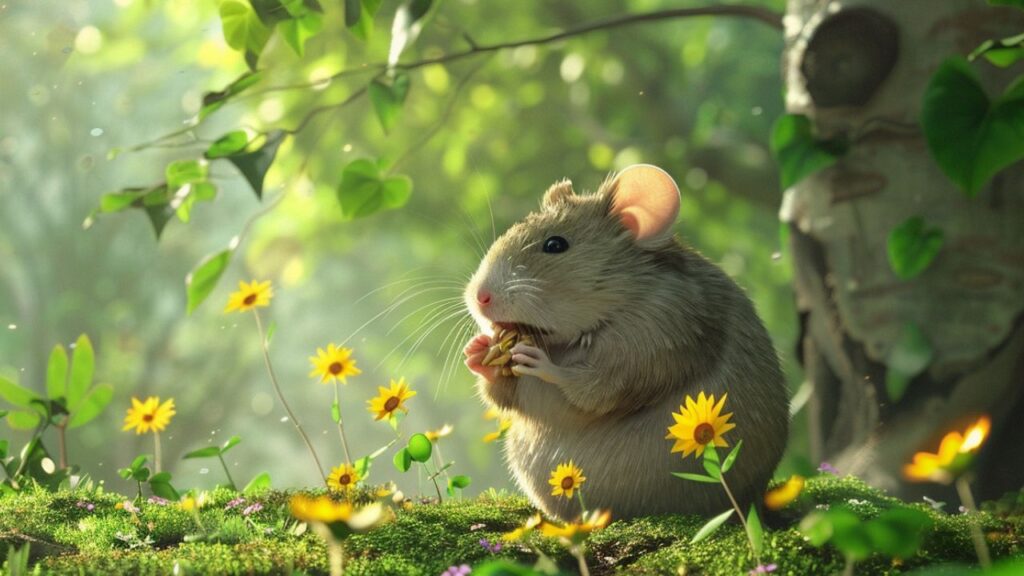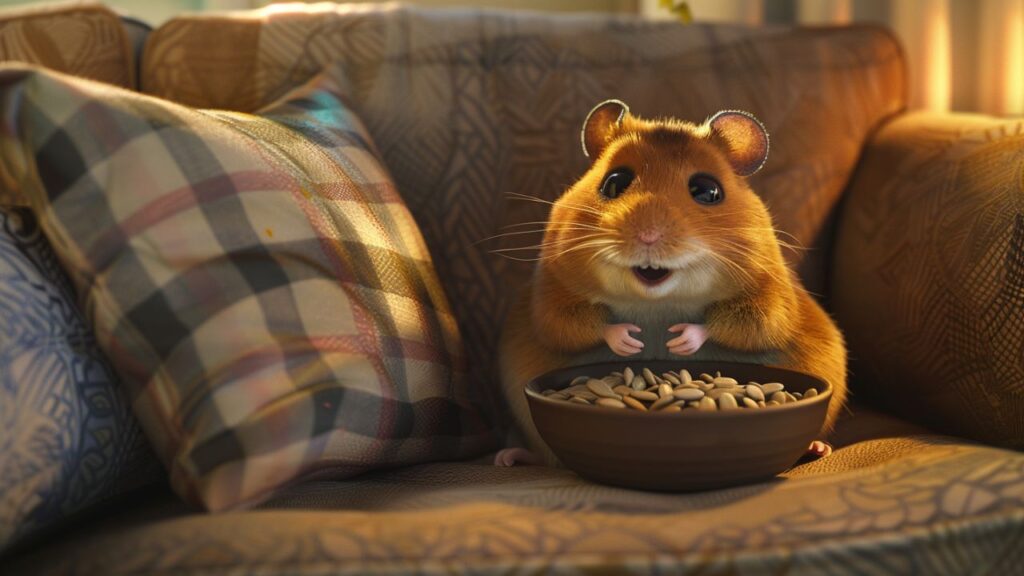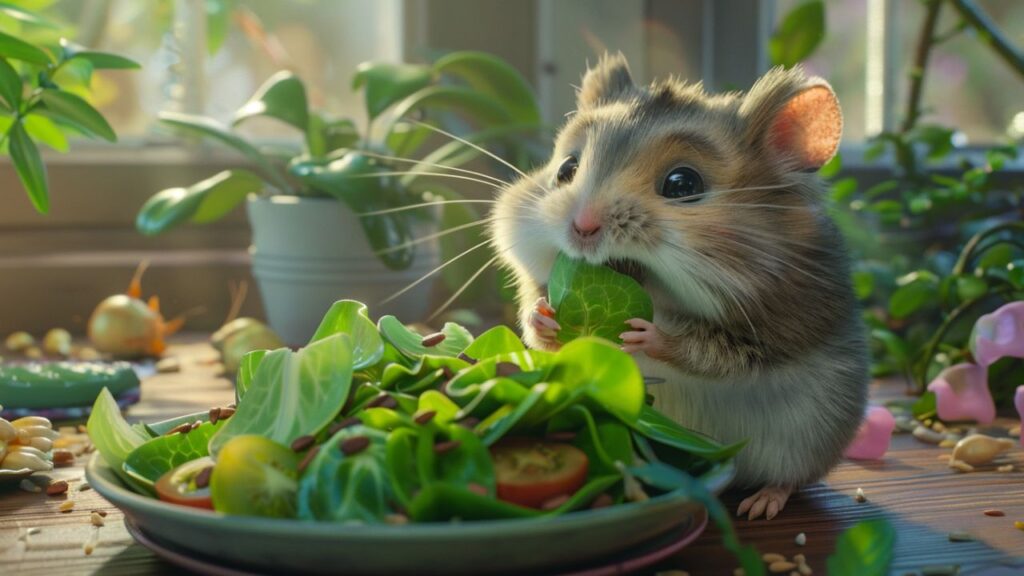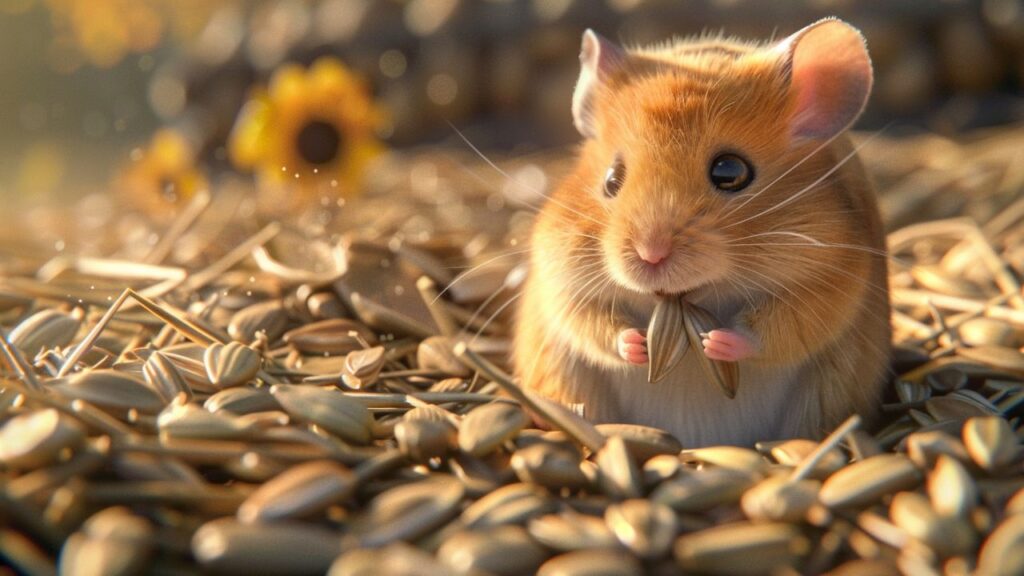TL;DR Summary
Yes, hamsters can eat sunflower seeds, but they should be given in moderation due to their high-fat content. Sunflower seeds are nutritious, offering proteins, vitamins E and B, and minerals beneficial to hamsters, but overfeeding can lead to obesity and nutritional imbalances. Treat your hamster to a couple of seeds every other day, ideally mixed with other healthy snacks, to keep their diet varied and balanced. Always ensure sunflower seeds are unsalted and consider offering them with the shell for extra enrichment. By responsibly managing sunflower seed intake, you can provide your hamster with tasty treats without compromising their health. Remember, a happy hamster is a wheel-y happy you!
When it comes to pampering our petite pals with treats, many hamster owners often wonder, “Can hamsters eat sunflower seeds?” It’s a query that pops up as often as our little furry friends pop up on their hind legs seeking snacks. The short answer is yes, hamsters can indeed munch on these sunny seeds, but there’s much more to the story than a simple nod of approval.
Why Sunflower Seeds?
Sunflower seeds aren’t just popular with birds; they have also carved out a spot in the hamster dietary discourse. Their appeal lies in their availability, size, and the ease with which hamsters can handle them, holding them between their paws as they nibble away. Not to mention, these seeds come with a crunch that hamsters seem to relish.
Establishing the Focus
In this comprehensive guide, we’ll delve deep into the nutritional benefits and potential risks of feeding sunflower seeds to hamsters. Our whiskered companions’ well-being is paramount, and with the keyword “can hamsters eat sunflower seeds” guiding our exploration, we’ll uncover all there is to know about incorporating these seeds into a hamster’s diet responsibly. So, let’s nibble our way through the shell of this topic and reveal the kernel of truth about hamsters and sunflower seeds.
Nutritional Profile of Sunflower Seeds
When considering the dietary habits of our furry little friends, it’s important to scrutinize the foods we offer them, ensuring they contribute to a wholesome and balanced diet. Sunflower seeds are a common treat given to pets, but what nutritional value do they hold, especially for hamsters? Let’s delve into the composition of these seeds to understand their role in our hamster’s health.
General Nutritional Value
Sunflower seeds are lauded for their dense nutritional content, packed with healthy fats, protein, fiber, and a range of vitamins and minerals. For humans, they are a powerhouse snack. But when it comes to hamsters, the rich fat content, which is primarily unsaturated, needs to be offered judiciously to avoid obesity and related health issues.
Beneficial Nutrients for Hamsters
The specific nutrients in sunflower seeds that are advantageous for hamsters include:
- Protein: Essential for growth and maintenance, protein in sunflower seeds helps in the repair and development of muscles and tissues in hamsters.
- Vitamin E: A potent antioxidant, vitamin E helps in maintaining healthy skin and coat in hamsters, along with supporting their immune system.
- Vitamin B complex: Components like thiamine and niacin in this complex are crucial for energy metabolism and optimal brain function.
- Minerals: Magnesium and phosphorus found in sunflower seeds contribute to strong bone health, while trace minerals like selenium play a role in various physiological functions, including thyroid hormone metabolism.
While these nutrients are essential, it’s crucial to understand that the high-fat content can quickly turn sunflower seeds from a healthy snack into a diet detriment if not moderated. Therefore, serving size and frequency should be carefully managed.
Sunflower Seeds in a Hamster’s Diet
The allure of sunflower seeds as a snack for hamsters often comes from their convenience and the apparent joy hamsters have while nibbling on them. However, the key to a healthy hamster diet is balance and moderation, just like with human nutrition. Let’s explore where sunflower seeds fit into this puzzle and clarify some myths along the way.
The Role of Seeds in a Balanced Hamster Diet
In the wild, hamsters consume a variety of grains, seeds, vegetables, and insects, which together create a diverse diet. Domestic hamsters can thrive on a similar diet, with a basis of high-quality hamster pellets complemented by a selection of fresh produce and the occasional seed treat. Sunflower seeds, in particular, can provide variety and enrichment to a hamster’s diet, offering both nutritional benefits and behavioral satisfaction through foraging.
When given in the right amounts, sunflower seeds can help ensure that a hamster receives a comprehensive range of nutrients. However, they should never be the mainstay of the diet. Overreliance on sunflower seeds can lead to an imbalance, particularly due to their high fat and calorie content, which can contribute to obesity and nutritional deficiencies.
Dispelling Common Misconceptions
- Misconception 1: “Sunflower seeds are a complete food for hamsters.“ Reality: While sunflower seeds are nutritious, they do not offer a hamster everything it needs. A complete hamster diet requires a mix of pellets, fresh vegetables, fruits, and occasional protein sources.
- Misconception 2: “Hamsters can regulate their seed intake naturally.“ Reality: Hamsters, especially in captivity, may not self-regulate effectively. They might overindulge in tasty sunflower seeds, ignoring other vital components of their diet.
- Misconception 3: “The fatter the hamster, the healthier it is.“ Reality: Excess weight in hamsters can lead to serious health problems such as diabetes, heart disease, and joint issues. Sunflower seeds should be rationed to prevent weight gain.
- Misconception 4: “All seeds are alike in terms of nutrition.” Reality: Different seeds have varied nutritional profiles. For example, pumpkin seeds have a different nutrient composition than sunflower seeds and can affect a hamster’s health differently.
Risks and Considerations
Sunflower seeds, while nutritionally rich, come with their own set of risks and considerations when introduced into a hamster’s diet. It’s crucial for hamster owners to be mindful of these factors to ensure the well-being of their tiny companions.
The Fat Factor
A major concern with sunflower seeds is their high-fat content. Although these fats are mostly unsaturated and beneficial in moderation, an excess can lead to weight gain and associated health issues in hamsters, such as obesity and heart disease. Hamsters are small, with correspondingly tiny dietary needs, so even a small number of high-fat seeds can become a significant portion of their daily caloric intake.
Moderation is Key
Understanding the concept of moderation is critical when feeding your hamster sunflower seeds. These seeds should not be a staple of the diet but rather an occasional treat. A few seeds a couple of times a week is a general guideline, but this should be adjusted based on the hamster’s size, activity level, and overall diet.
Potential Health Impact
The impact of overfeeding sunflower seeds can extend beyond weight issues. Hamsters can develop a preference for these tasty seeds, leading them to eschew other vital components of their diet, resulting in nutritional deficiencies. Furthermore, the high-fat content may contribute to fatty liver disease, a serious health condition for hamsters.
Monitoring and Adjustments
When introducing sunflower seeds into your hamster’s diet, observe their overall health and weight. Be ready to adjust the amount of sunflower seeds accordingly, and always consider the complete diet to ensure it remains balanced and diverse.
In summary, while sunflower seeds can be a healthy addition to your hamster’s diet, they come with significant risks if not properly managed. Moderation, variety, and close observation are the pillars of safely incorporating these seeds into your furry friend’s feeding regimen. By keeping these factors in check, you can indulge your hamster’s taste buds without compromising their health.
Whisker Tips: Serving Sunflower Seeds Safely
Treats are a delightful part of any hamster’s diet, and sunflower seeds can be included if done so with care. Here’s how to sprinkle these seeds into your hamster’s life without going overboard.
Measured Munchies
First and foremost, always measure the sunflower seeds you give to your hamster. A pinch (about two to three seeds) every other day is plenty for a little critter. It’s tempting to give more when they look at you with those adorable beady eyes, but stand firm for the sake of their health!
Shelling Out Fun
Offer sunflower seeds with the shell on occasionally. It takes longer for hamsters to eat them, which provides mental stimulation as they work to get to the seed inside. Just be sure the shells aren’t treated with any salt or other seasonings.
Mix It Up
Rather than a sunflower seed solo act, create a mixed salad of treats including other healthy items like bits of vegetables and fruits appropriate for hamsters, like carrots, cucumbers, or apples. This variety ensures they’re getting a range of nutrients and textures.
Nutritional Balance
Always integrate sunflower seeds into a balanced diet. The bulk of a hamster’s nutrition should come from high-quality hamster pellets, which are formulated to meet their needs. Treats like sunflower seeds are just the cherry on top!
Healthy Alternatives
If you’re looking for alternatives to sunflower seeds, consider offering other hamster-safe snacks like pumpkin seeds, fresh vegetables, or whole grain cereals in moderation. These can provide the excitement and variety your hamster craves without the risk of excessive fat intake.
Treats as Training Tools
Use sunflower seeds as rewards during playtime or training sessions. This not only reinforces positive behavior but also regulates the quantity of seeds your hamster consumes.
Conclusion
In the whirlwind of information about hamster diets, we’ve nestled into the cozy topic of sunflower seeds and their place in the petite world of hamster cuisine. We’ve unpacked the nutritional profile of these seeds, highlighting their benefits like protein, vitamins, and minerals vital for your hamster’s health. We’ve also explored the role that sunflower seeds can play in a hamster’s diet, ensuring they are a treat, not a staple.
It’s crucial to be aware of the risks and considerations, such as the high-fat content and the importance of moderation to prevent obesity and nutritional imbalance. Adjusting the amount and frequency of sunflower seeds is key, as is monitoring your hamster’s health in response to their diet.
Our “Whisker Tips” have provided practical steps for integrating these seeds safely into your hamster’s diet, ensuring that these treats remain beneficial rather than detrimental. We’ve also offered alternative snack options to keep your hamster’s menu diverse and nutritionally sound.
As caring hamster owners, it’s our duty to uphold responsible feeding practices, balancing our desire to spoil our fluffy companions with the necessity of maintaining their health. Let’s make sure every seed counts, every nibble is nutritious, and every hamster wheel spins with the joy of a well-fed, healthy pet.
Remember, a happy hamster is a wheel-y happy you!









